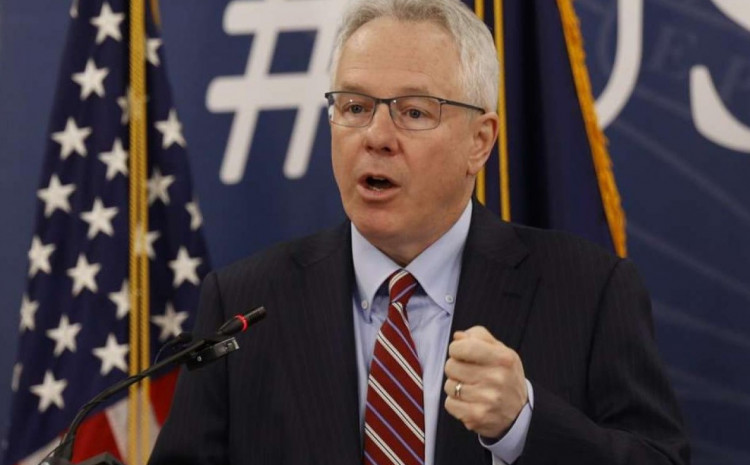Citizens’ trust in the ability of Bosnia and Herzegovina’s judiciary system to tackle corruption is at an all-time low. The public’s perception of the level of accountability of public officials, of judicial impartiality, and of the conduct of judges and prosecutors has also deteriorated significantly in the past year.
Some prosecutors and judges even acknowledge that they are part of the problem, believe that their own profession is highly susceptible to bribery, and see the system as compromised by political influence and corruption.
In short, BiH’s judicial system is not working, and citizens – and the judiciary – know it.
These statements are backed up by data contained in the U.S. government’s most recent Judicial Effectiveness Index for BiH (JEI-BiH), a survey conducted annually by the United States in partnership with the High Judicial and Prosecutorial Council (HJPC) designed to monitor and evaluate judicial performance.
The United States and other friends of BiH fund programs in the judicial sector because significant change is needed to achieve an acceptable level of respect for the rule of law. But our funding is not indefinite. We must see progress and a commitment by the HJPC, judges, and prosecutors to reform. That means the judiciary must prosecute corrupt actors. Before it can do that, however, it must clean its own house.
I am not satisfied. Indeed, no one should be satisfied when the most corrupt are free and when those in power are untouchable at the expense of ordinary citizens.
A fair and independent judiciary is essential to any democratic system of government. It ensures accountability, equality, and access to justice for all. Respect for the rule of law reassures citizens that all rights are respected and protected. It also empowers them to make a positive contribution to the economy and society.
The Consequences
The issues that matter most to BiH citizens – good jobs, good schools, reliable health care, and rule of law – are often ignored by corrupt leaders. This is a prime reason people are leaving this beautiful country.
Stability in BiH requires public confidence in the institutions charged with enforcing its laws, especially the criminal justice system. Enforcing the law is not about political affiliations, personal interests, or retribution. An independent judiciary must be free of undue influence for BiH to have the rule of law – which means absolutely no one is above the law and everyone is equal under it.
Yet many judges and prosecutors follow the path of least resistance, self-censoring their work and opting to process simpler cases to avoid controversial work because the system rewards quantity, not quality. This results in near total impunity for corrupt people in power, the so-called “big fish” who commit high-level corruption and organized crimes.
Prosecutors have tremendous power to bring criminal charges against those who break the law. And here I want to be clear: Some BiH prosecutors have been bold and brave in prosecuting corruption. Their efforts should be commended. We value individuals with high personal integrity and a sense of moral responsibility to discharge their duty as prosecutors. They understand that they, as public servants, have been entrusted with the important role of fighting corruption. The U.S. government stands firmly behind these individuals.
But the HJPC, court presidents, and chief prosecutors too often have neither resourced nor protected those who aggressively prosecute powerful public officials who abuse the law for personal and political gain.
A Step in the Right Direction
At the initiative of opposition parties from both entities, and despite resistance from SNSD and HDZ BiH, the BiH Parliament for the first time ever formed a committee to investigate the judicial system in May 2020. The committee interviewed numerous witnesses, primarily judges and prosecutors, who confirmed in their own words the findings of the United States’ JEI-BiH survey.
The committee report, published in June 2022, pinpointed the weaknesses that directly affected the efficiency of the judicial system: political influence and corruption. The report is particularly valuable because it was agreed to unanimously by committee members from across the political spectrum.
Supporting BiH Citizens to Create a Brighter Future
The U.S. government is committed to working with judges and prosecutors who champion fair, equal, transparent justice and are committed to stopping and prosecuting corrupt actors. We strive to improve the performance, transparency, and responsiveness of judicial institutions in dealing with corruption and economic crimes cases and build their capacity to resist improper external influences. We do this for the citizens – and local officials should too.
The HJPC and the judiciary should take immediate action to change the performance evaluation system for judges and prosecutors, so they are incentivized to work on cases of high-level corruption. They must make the career advancement criteria transparent and objective.
The HJPC must root out corruption within its own ranks. Anti-corruption champions exist throughout the judiciary, but their effectiveness is hampered due to undue political interference.
Finally, the executive branch of government needs to ensure adequate resources for the prosecution of high-level corruption cases and improve coordination between law enforcement agencies to expedite the process.
The people of this country deserve a judicial system that works for all, not just the few.
I want to be perfectly clear: the U.S. government will stand with citizens fighting for respect for the rule of law, and with those courageous individuals genuinely trying to improve the lives of all the people of Bosnia and Herzegovina.

